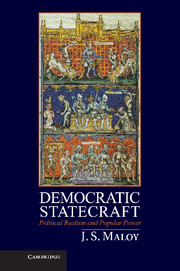5 - From Machiavelli to the Puritans
Fire Fights Fire
Published online by Cambridge University Press: 05 March 2013
Summary
Senate, noun. A body of elderly gentlemen charged with high duties and misdemeanors.
Ambrose Bierce, The Devil’s DictionaryThere was more to the Puritans than identifying liberated women as witches and burning them. Plenty of hostility was kept in reserve, for use against their duly appointed governors. This was true, at any rate, of a significant minority within the ranks of zealous early-modern English Protestants, a faction that deserves to be remembered among the few genuine democrats of the seventeenth century. Whoever finds them unsettling as moralizers nonetheless owes them consideration as institutional designers.
The contributions of Puritanism to the kind of political theory in which statecraft overlaps with democracy are obscured when we fix attention on Puritan idealism. The Protestant Reformation is often credited with translating the abstract moral equality of humans as children of God into new forms of social and political equality. Within the ranks of Protestantism, Puritans tended to insist on the more extreme agendas of institutional reform according to the more literal interpretations of biblical models and directives, occasionally resulting in real gains for individual liberty and social equality. The Pilgrims who sailed from England to the American continent in 1620 are a famous instance. Even more dramatic and portentous, arguably, were the trial and execution of King Charles I in 1649 by the officers of Oliver Cromwell’s New Model Army and their supporters in Parliament. But these examples have often been remembered in a way that gives short shrift to Puritan realism. In fact, whatever genuinely democratic content could be found in Puritanism came, strangely enough, from a fringe element that flirted dangerously with a source usually considered beyond the pale: Niccolo Machiavelli.
- Type
- Chapter
- Information
- Democratic StatecraftPolitical Realism and Popular Power, pp. 110 - 144Publisher: Cambridge University PressPrint publication year: 2013



